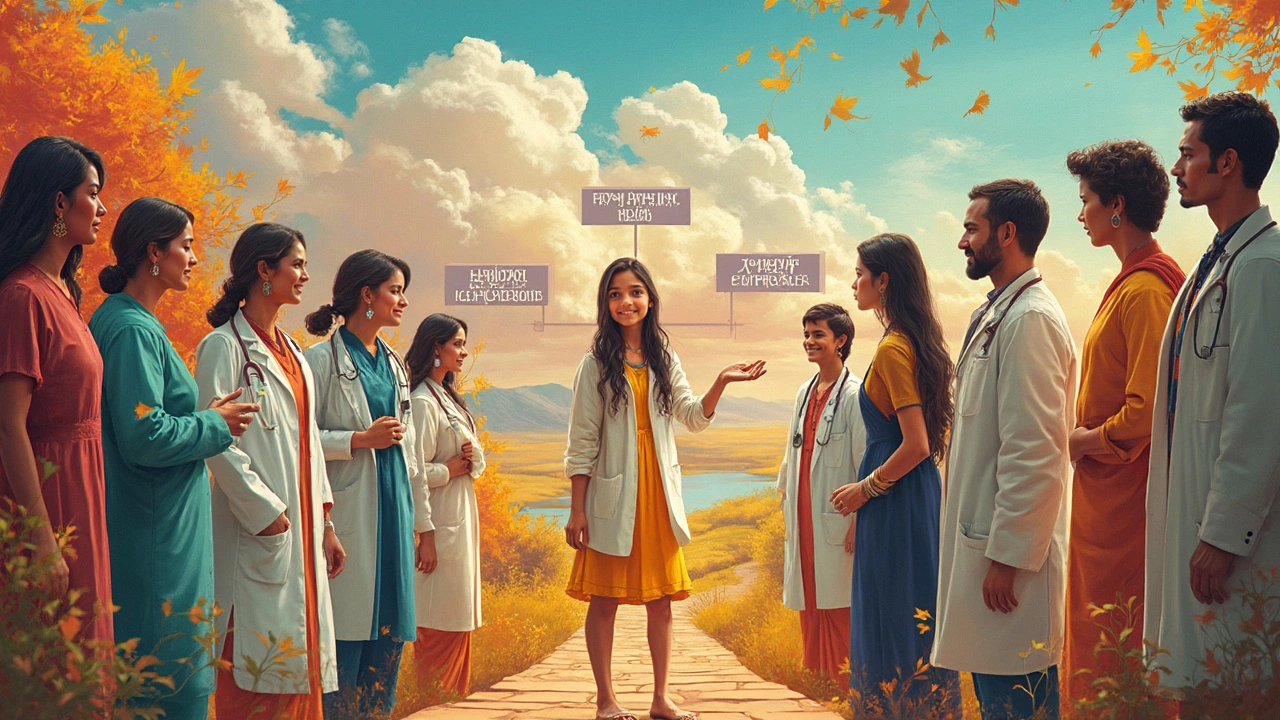You've cracked the NEET, and while that's a huge feat worth celebrating, the journey's just beginning. Choosing the right specialization and doctor to guide you is crucial for a successful medical career. But how do you decide?
First things first, understanding the variety of specializations available in medicine can feel overwhelming. But knowing your options influences where you find your passion. Cardiology, dermatology, or perhaps pediatrics—each offers unique experiences and lifestyle accommodations.
Your interests and strengths play a massive role in this decision. Are you drawn to the mysteries of the brain or fascinated by the human heart? Take some time to self-reflect. Don't just rely on hearsay or popularity; what truly sparks your curiosity?
- Understanding Specializations
- Evaluating Personal Interests
- Researching Medical Trends
- Considering Work-Life Balance
Understanding Specializations
Deciding on a medical specialization post-NEET is like choosing the path of your future lifestyle and career. There are numerous fields to explore, each with its own unique challenges and rewards, so finding the right fit is key.
Popular Specializations
Some of the popular specialties include cardiology, known for its critical role in heart health; pediatrics, which allows you to work with children; and dermatology, which often offers a good work-life balance. Each of these fields demands different skill sets and passion.
Emerging Fields
Keep an eye out for emerging fields, too. With medical technology advancing rapidly, specializations in robotic surgery, telemedicine, or genetic research are becoming increasingly important. These fields may offer exciting opportunities and aren't as saturated.
Factors to Consider
- Interest and Passion: Follow what intrigues you. Passion often fuels perseverance and excellence.
- Length of Training: Some fields, like neurosurgery, require years of extensive training, which can affect your career timeline.
- Lifestyle: Consider the work-life balance each specialty offers. While some may have fixed hours, others might demand more on-call time.
- Financial Aspects: Take into account the earning potential. Some specializations may offer higher financial rewards than others.
Let's look at a quick comparison of a few notable specializations:
| Specialization | Training Duration | Average Salary |
|---|---|---|
| Cardiology | 6-8 years | £70,000-£120,000 |
| Pediatrics | 3-5 years | £60,000-£90,000 |
| Dermatology | 4-6 years | £80,000-£110,000 |
Ultimately, choosing your path is incredibly personal. Make sure to gather as much info as possible about the fields that spark your interest and talk to professionals already in those areas. Get a sense of not just the daily routines, but the long-term career prospects and advancements within each field. The right choice can lead you to a satisfying and impactful medical career.
Evaluating Personal Interests
After the whirlwind of prepping and passing the NEET, it's time to focus on what you truly enjoy. Choosing a specialization isn't just about the prestige or the paycheck—it's about finding the right balance between passion and profession in your medical career.
Reflect on Your Experiences
Think about your clinical rotations or volunteering experiences. Was there a particular area that excited you, or where you felt naturally skilled? Often, the situations where you lose track of time indicate your genuine interests. Jot down these moments—they're goldmines for understanding your personal inclinations.
Talk to Practicing Doctors
Engage with various doctors already practicing in fields you're curious about. Ask them what they love and what challenges they face. Real-world insights can provide clarity beyond what textbooks or lectures offer. Many budding doctors find that shadowing someone for a day can be incredibly enlightening.
Consider Long-Term Goals
Do you see yourself involved in patient care, or does medical research strike a chord? It's important to evaluate whether your interests align with your long-term ambitions. Remember, a medical career requires commitment, so picking a specialization congruent with your lifestyle and aspirations is crucial.
Get Informed on Current Medical Trends
Some specializations are on the rise due to advancements in technology and changing health needs. Keeping abreast of medical trends could not only fuel your passion but also secure a bright career path. For instance, there's notable growth in areas like telemedicine and personalized healthcare.
| Specialization | Growth Rate (%) |
|---|---|
| Telemedicine | 25% |
| Personalized Healthcare | 20% |
| Geriatrics | 15% |
Ultimately, pursuing a specialization that matches your interests and current growth in the field can lead to a satisfying and rewarding journey in medicine.

Researching Medical Trends
Staying updated with medical career trends is a game-changer. The medical field is always on the move, with new technologies and treatments popping up and changing everything. Knowing what's trending can help you make a smart choice about your future specialization.
For instance, telemedicine has become a significant focus in recent years. With patients becoming more tech-savvy, the demand for virtual consultations has shot up. This is especially true after the COVID-19 pandemic, which made remote care a necessity. If technological integration excites you, diving into telehealth could be a future-proof option.
Technology and Innovation
Robotics and AI are making waves, especially in surgery and diagnostics. Surgeons using robotic tools for precision surgeries are in high demand. Why not consider specializations that could utilize these advancements?
Focus on Non-Traditional Areas
Functional medicine and holistic approaches to health are gaining traction. People are looking for ways to treat causes rather than symptoms. If you resonate with a comprehensive look at health, this might be an interesting path to follow.
Understanding Demographic Changes
As populations age, geriatrics is becoming increasingly important. Elderly patient care involves both specialized knowledge and a compassionate approach. With a growing aging population, geriatrics offers a stable career path.
| Year | Percentage of Telemedicine Adoption |
|---|---|
| 2023 | 25% |
| 2025 | 45% |
Staying tuned into these trends not only prepares you but also equips you with the knowledge to choose a specialization that aligns with your passion and current demand.
Considering Work-Life Balance
It's easy to get swept up in the excitement of starting your medical career post-NEET, but it's important to take a step back and think about the work-life balance that's right for you. Different medical specializations come with varying demands on your time and energy, so it's worth considering what kind of schedule you envision for your future.
Time Demands of Different Specializations
Some fields like surgery or emergency medicine might offer more adrenaline but often require odd hours and on-call duties. If you thrive in high-pressure environments and enjoy the rush, this might suit you. However, if having a predictable workweek and more personal time is a priority, you might lean toward specializations like dermatology or general internal medicine, which generally offer more regular hours.
Long-Term Lifestyle Considerations
While passion is key, don't underestimate the importance of how your job might impact your lifestyle long-term. Balancing family, hobbies, and downtime is not just about leisure, but mental and physical health too. According to some informal surveys, doctors in fields like psychiatry and ophthalmology report higher levels of job satisfaction due to a more manageable work-life balance.
Career Growth and Flexibility
Think about the growth opportunities and flexibility within your chosen field. Some specializations offer opportunities for teaching, research, or working in policy, which can add variety and flexibility to your career. A doctor in a highly specialized field might face limited job options and strict career paths, while a general practitioner might enjoy more flexibility to shift roles.
Here's a quick look at how different fields stack up in terms of work-life balance:
| Specialization | Average Work Hours/Week | Work-Life Balance Rating |
|---|---|---|
| Dermatology | 40-45 | High |
| Emergency Medicine | 50-60 | Medium |
| Surgery | 60+ | Low |
| Psychiatry | 35-45 | High |
Ultimately, every doctor has personal preferences, and what works for one might not work for another. Prioritize what's most important to you and align your career path to those values.





